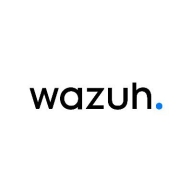

Logpoint and Wazuh compete in logging solutions, with Logpoint having an edge due to its robust SIEM and SOAR integration and user-friendly interface.
Features: Logpoint offers a robust logging solution with flexible search, analytics, and SIEM and SOAR capabilities, along with machine learning for endpoint monitoring. It supports numerous third-party integrations and provides exceptional dashboards. Wazuh, being free and open-source, provides great cloud service integration, modules like PCI DSS compliance, and essential logging features, making it ideal for small to medium-sized organizations. Its strong open-source community support adds versatility.
Room for Improvement: Logpoint struggles with complex logs, on-premises implementation, and high resource demands, requiring more third-party integrations and better documentation. Wazuh lacks built-in AI, user-friendly threat intelligence, and comprehensive support, with challenges in alert setups and scalability in its free version.
Ease of Deployment and Customer Service: Logpoint mainly operates on-premises, with a demanding setup and limited U.S. support. Its customer service is reliable but faces language and speed issues. Wazuh is adaptable to various environments, including cloud, but suffers from incomplete documentation and slow support response, though it offers deployment flexibility.
Pricing and ROI: Logpoint uses a fixed, device-based pricing model, offering predictability and cost-effectiveness, though additional modules might add costs. Users find value in compliance and operational efficiencies. Wazuh is an open-source solution with no initial licensing fees, but setup and maintenance may incur hidden costs, differentiating its cost structure from Logpoint's fixed model.
I have seen value in security cost savings with Wazuh, as using proprietary EDR versions could save us substantial money.
Logpoint's customer support is not sufficient with only one engineer in the US.
The technical support for Logpoint is very good, and I would rate it as nine out of ten.
I recommend a submission to Logpoint because I worked with it before.
They responded quickly, which was crucial as I was on a time constraint.
We use the open-source version of Wazuh, which does not provide paid support.
The documentation is good and provides clear instructions, though it's targeted at those with technical backgrounds.
It is web-based and accommodates the expansion of our organization.
Logpoint is scalable and capable of expanding.
It can accommodate thousands of endpoints on one instance, and multiple instances can run for different clients.
Currently, I don't see any limitations in terms of scalability as Wazuh can still connect many endpoints.
Scalability depends on the configuration and the infrastructure resources like compute and memory we allocate.
I have received reports indicating glitches and downtimes with Logpoint.
The stability of Wazuh is strong, with no issues stemming from the solution itself.
The stability of Wazuh is largely dependent on maintenance.
The indexer frequently times out, requiring system restarts.
Dealing with foreign entities for support was a challenge, leading us to switch providers due to lack of adequate support.
Logpoint needs to be cloud-native, as currently, it is not.
Logpoint's UEBA is a weak point, while Exabeam's UEBA has extra AI through automation.
Machine learning is needed along with understanding user behavior and behavioral patterns.
The integration modules are insufficiently developed, necessitating the creation of custom integration solutions using tools like Logstash and PubSub.
I think Wazuh should improve by introducing AI functionalities, as it would be beneficial to see AI incorporated in the threat hunting and detection functionalities.
I rate the pricing at eight, suggesting it's relatively good or affordable.
Wazuh is completely free of charge.
I would definitely recommend Wazuh, especially considering Fortinet's licensing model which is confusing and overpriced in my opinion.
Totaling around two lakh Indian rupees per month.
The UEBA enables us to monitor at the device level, and SOAR provides playbooks and templates that we can modify and incorporate into the platform.
It effectively facilitates logging and log storage and assists in security event management by ingesting security events.
The most valuable feature, which is endpoint security, is included in Logpoint, and an extra feature is the integration.
Wazuh is a SIEM tool that is highly customizable and versatile.
The system allows us to monitor endpoints effectively and collect security data that can be utilized across other platforms such as SOAR.
With this open source tool, organizations can establish their own customized setup.
| Product | Market Share (%) |
|---|---|
| Wazuh | 8.3% |
| Logpoint | 0.9% |
| Other | 90.8% |

| Company Size | Count |
|---|---|
| Small Business | 18 |
| Midsize Enterprise | 3 |
| Large Enterprise | 4 |
| Company Size | Count |
|---|---|
| Small Business | 27 |
| Midsize Enterprise | 15 |
| Large Enterprise | 8 |
Logpoint is a cutting-edge security information and event management (SIEM) solution that is designed to be intuitive and flexible enough to be used by an array of different businesses. It is capable of expanding according to its users' needs.
Benefits of Logpoint
Some of the benefits of using Logpoint include:
Reviews from Real Users
Logpoint is a security and management solution that stands out among its competitors for a number of reasons. Two major ones are its data gathering and artificial intelligence (AI) capabilities. Logpoint enables users to not only gather the data, but also to maximize both the amount of data that can be gathered and its usefulness. It removes many of the challenges that users may face in data collection. The solution allows users to set rules for collection and then it pulls information from sources that meet the rules that have been set. This data is then broken into manageable segments and ordered. Users can then analyze these ordered segments with ease. Additionally, LogPoint utilizes both machine learning and AI technology. Users gain the ability to protect themselves from and if necessary resolve emerging threats as soon as they arise. The AI sets security parameters for a user’s system. These act as a baseline that are triggered and notify the user if anything deviates from the rules that it set up.
The chief infrastructure & security officer at a financial services firm writes, “It is a very comprehensive solution for gathering data. It has got a lot of capabilities for collecting logs from different systems. Logs are notoriously difficult to collect because they come in all formats. Logpoint has a very sophisticated mechanism for you to be able to connect to or listen to a system, get the data, and parse it. Logs come in text formats that are not easily parsed because all logs are not the same, but with Logpoint, you can define a policy for collecting the data. You can create a parser very quickly to get the logs into a structured mechanism so that you can analyze them.”
A. Secca., a Cyber Security Analyst at a transportation company, writes, “It is an AI technology because it is using machine learning technology. So far, there is nothing better out there for UEBA in terms of monitoring endpoints and user activity. It is using machine learning language, so it is right at the top. It provides that capability and monitors all of the user’s activities. It devises a baseline and monitors if there is any deviation from the baseline.”
Wazuh offers an open-source platform designed for seamless integration into diverse environments, making it ideal for enhancing security infrastructure. Its features include log monitoring, compliance support, and real-time threat detection, providing effective cybersecurity management.
Wazuh stands out for its ability to integrate easily with Kubernetes, cloud-native infrastructures, and various SIEM platforms like ELK. It features robust MITRE ATT&CK correlation, comprehensive log monitoring capabilities, and detailed reporting dashboards. Users benefit from its file integrity monitoring and endpoint detection and response (EDR) capabilities, which streamline compliance and vulnerability assessments. While appreciated for its customization and easy deployment, room for improvement exists in scalability, particularly in the free version, and in areas such as threat intelligence integration, cloud integration, and container security. The platform is acknowledged for its strong documentation and technical support.
What are the key features of Wazuh?In industries like finance, healthcare, and technology, Wazuh is utilized for its capabilities in log aggregation, threat detection, and vulnerability management. Companies often implement its features to ensure compliance with stringent regulations and to enhance security practices across cloud environments. By leveraging its integration capabilities, organizations can achieve unified security management, ensuring comprehensive protection of their digital assets.
We monitor all Security Information and Event Management (SIEM) reviews to prevent fraudulent reviews and keep review quality high. We do not post reviews by company employees or direct competitors. We validate each review for authenticity via cross-reference with LinkedIn, and personal follow-up with the reviewer when necessary.